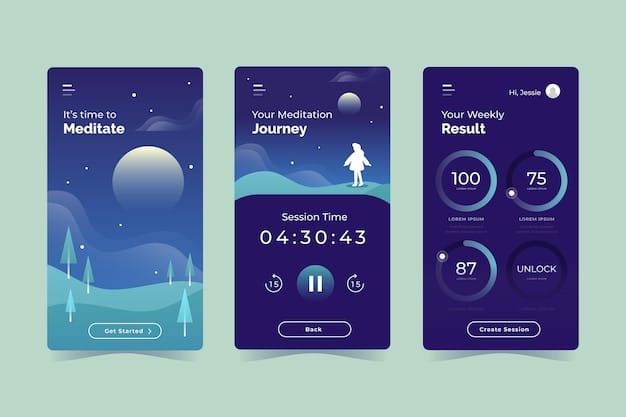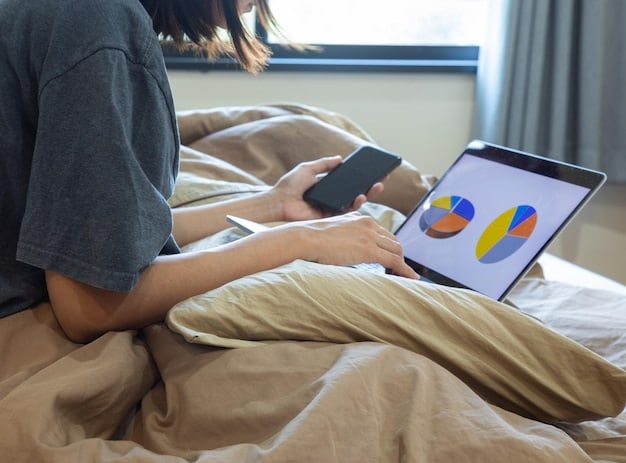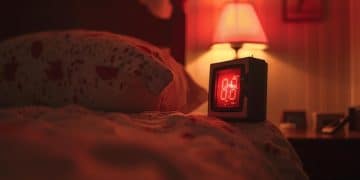Sleep Apps vs. Sleep Consultants: Which Sleep Solution is Best for You?

Choosing between sleep apps and sleep consultants depends on individual needs, budget, and preferences; sleep apps offer affordable, self-guided solutions, while sleep consultants provide personalized, expert support for complex sleep issues.
Are you struggling with sleepless nights? Deciding between sleep apps vs. sleep consultants can be a confusing choice. Both offer unique benefits, but which one is the right fit for your specific sleep challenges?
Understanding Sleep Apps and Their Benefits
Sleep apps have surged in popularity as accessible tools for improving sleep quality. Offering a range of features from guided meditations to sleep tracking, these apps aim to address common sleep issues conveniently.
What Sleep Apps Offer
Sleep apps typically provide a variety of functions designed to promote better sleep habits and address sleep disturbances.
- Sleep Tracking: Monitors sleep patterns, including sleep stages, duration, and interruptions.
- Guided Meditations: Offers relaxation techniques and mindfulness exercises to ease the mind before sleep.
- Soundscapes and White Noise: Plays calming sounds or white noise to mask environmental disruptions.
- Sleep Schedules and Reminders: Helps establish a consistent sleep routine with personalized bedtime and wake-up reminders.

Pros of Using Sleep Apps
Choosing a sleep app can be a beneficial first step in addressing sleep problems, offering several advantages.
- Affordability: Many sleep apps offer free versions or low-cost subscriptions compared to the expense of a sleep consultant.
- Convenience: Accessible anytime, anywhere, providing immediate support for sleep issues.
- Variety of Options: A wide array of features and techniques allows users to experiment and find what works best for them.
- Data Tracking: Provides insights into your sleep patterns, helping you identify potential triggers and areas for improvement.
In conclusion, sleep apps are a cost-effective and convenient tool for those seeking to improve their sleep, offering a range of features to help establish better sleep habits and understand their sleep patterns.
The Role of Sleep Consultants in Addressing Sleep Issues
When sleep apps fall short, a sleep consultant can provide personalized, expert guidance. These professionals assess individual sleep challenges and develop tailored strategies for lasting improvement.
What Does a Sleep Consultant Do?
Sleep consultants offer specialized support, conducting thorough assessments and creating customized sleep plans.
- Comprehensive Assessment: Evaluates medical history, lifestyle factors, and sleep environment to identify underlying issues.
- Customized Sleep Plans: Develops personalized strategies that address specific sleep challenges, such as insomnia or sleep apnea.
- Behavioral Therapy Techniques: Implements cognitive behavioral therapy for insomnia (CBT-I) to modify negative sleep-related thoughts and behaviors.
- Ongoing Support and Adjustments: Provides continuous guidance and adjusts the sleep plan as needed based on progress and feedback.
Pros of Working with a Sleep Consultant
Opting for a sleep consultant can be advantageous for individuals with complex sleep disorders or those seeking personalized guidance.
- Personalized Approach: Tailored strategies that address individual needs and circumstances, leading to more effective solutions.
- Expert Guidance: Professional support from trained specialists with in-depth knowledge of sleep disorders and treatments.
- Comprehensive Solutions: Addresses underlying issues and considers all aspects of sleep health, including medical, behavioral, and environmental factors.
- Accountability and Motivation: Provides ongoing support and encouragement to help individuals stay committed to their sleep improvement goals.
In summary, sleep consultants provide expert, personalized support for complex sleep issues, offering tailored strategies and continuous guidance for lasting improvement.
Cost Comparison: Sleep Apps vs. Sleep Consultants
One of the primary factors in deciding between sleep apps and sleep consultants is the cost. Understanding the financial implications of each option can help you make an informed choice.
Cost of Sleep Apps
Sleep apps are generally more affordable, with various pricing models.
- Free Versions: Many sleep apps offer basic features for free, allowing users to try out the app before committing to a subscription.
- Subscription Models: Premium features often require a subscription, typically ranging from $5 to $20 per month.
- One-Time Purchases: Some apps offer a one-time purchase option for access to all features, usually priced between $50 and $100.
Cost of Sleep Consultants
Hiring a sleep consultant is a more significant investment, with costs varying based on experience and services offered.
- Initial Consultation: The first session can range from $100 to $300, depending on the consultant’s expertise and location.
- Customized Sleep Plans: Comprehensive sleep plans can cost between $500 and $1500, including ongoing support and follow-up sessions.
- Package Deals: Many consultants offer package deals that include multiple sessions and resources, which can be more cost-effective than individual sessions.

In conclusion, while sleep apps offer a budget-friendly entry point for sleep improvement, sleep consultants provide a more intensive and personalized approach at a higher cost, making the choice dependent on individual financial considerations and sleep needs.
Personalization and Customization: Tailoring Sleep Solutions to Your Needs
The degree of personalization and customization available is a crucial consideration when choosing between sleep apps and sleep consultants. Your unique needs should dictate the best approach.
Sleep Apps: A General Approach
Sleep apps often provide standardized solutions that may not address individual complexities.
- Standardized Programs: Offer pre-designed programs that may not consider specific medical conditions or lifestyle factors.
- Limited Customization: Allow some personalization of settings and preferences but may lack the ability to address unique sleep challenges effectively.
- Self-Guided Approach: Requires users to self-monitor and adjust strategies based on their own experiences, which can be challenging for some.
Sleep Consultants: A Tailored Approach
Sleep consultants excel in providing highly personalized and customized solutions.
- In-Depth Assessment: Conduct thorough evaluations to understand the underlying causes of sleep issues, enabling targeted interventions.
- Individualized Plans: Develop customized sleep plans that address specific needs, goals, and medical considerations.
- Ongoing Adjustments: Continuously monitor progress and make adjustments to the sleep plan as needed, ensuring optimal outcomes.
In summary, while sleep apps offer a broad, self-guided approach, sleep consultants provide a tailored and responsive strategy, making them suitable for those requiring personalized attention and comprehensive care.
Effectiveness: Which Option Delivers Better Results?
The effectiveness of sleep apps versus sleep consultants is a key factor. Consider your individual sleep challenges and desired outcomes when making your decision.
Sleep Apps: Assessing the Impact
The effectiveness of sleep apps varies depending on the individual and the app’s features.
- Mild Sleep Disturbances: May be effective for individuals with mild insomnia or sleep disturbances related to stress or anxiety.
- Limited Evidence: Research on the effectiveness of sleep apps is still emerging, with mixed results reported in studies.
- Requires Consistency: Success depends on consistent use and adherence to the app’s recommendations, which can be challenging for some users.
Sleep Consultants: Measuring Success
Sleep consultants often yield more consistent and significant improvements in sleep quality.
- Proven Techniques: Utilize evidence-based strategies, such as cognitive behavioral therapy for insomnia (CBT-I), which has demonstrated effectiveness in treating sleep disorders.
- Higher Success Rates: Individuals working with sleep consultants often report higher satisfaction and improved sleep outcomes compared to those using sleep apps alone.
- Long-Term Benefits: Provide tools and techniques for maintaining good sleep habits over the long term, resulting in lasting improvements.
In essence, while sleep apps can be useful for mild sleep issues, sleep consultants typically offer more effective and sustainable solutions for complex sleep disorders through personalized, evidence-based strategies.
Making the Right Choice: Factors to Consider
Choosing between sleep apps and sleep consultants involves evaluating several factors to determine the best fit for your specific needs and circumstances. Consider these elements to make an informed decision.
Evaluate Your Sleep Needs
Assess the severity and complexity of your sleep challenges.
- Mild Insomnia: If you experience occasional sleeplessness due to stress or lifestyle factors, a sleep app may suffice.
- Chronic Sleep Disorders: For persistent conditions like insomnia, sleep apnea, or restless legs syndrome, a sleep consultant is likely more appropriate.
- Underlying Medical Conditions: If your sleep issues are related to medical conditions, consult with a healthcare professional and consider a sleep consultant for specialized care.
Consider Your Budget
Determine how much you are willing to invest in improving your sleep.
- Cost-Effective Option: Sleep apps offer an affordable entry point for those seeking to improve their sleep without significant financial investment.
- Significant Investment: Sleep consultants require a larger financial commitment but may provide more comprehensive and effective solutions for complex sleep issues.
In conclusion, selecting between sleep apps and sleep consultants requires careful consideration of your sleep needs, budget, and preferences, ensuring you choose the most suitable path to better sleep.
| Key Aspect | Brief Description |
|---|---|
| 📱 Affordability | Sleep apps are typically cheaper with free or subscription options. |
| 🧑⚕️ Personalization | Sleep consultants offer personalized plans based on individual needs. |
| ⏱️ Convenience | Sleep apps are easily accessible anytime, anywhere. |
| ✅ Effectiveness | Consultants often yield better results for complex sleep issues. |
FAQ
▼
Sleep apps can provide some relief, but they might not be sufficient for chronic insomnia. A sleep consultant or cognitive behavioral therapy for insomnia (CBT-I) may be more effective.
▼
A sleep consultant’s fees can vary, but initial consultations usually range from $100 to $300, with full sleep plans costing between $500 and $1500, depending on the services provided.
▼
Sleep apps can provide estimates of your sleep patterns, but they are not as accurate as professional sleep studies conducted in a lab. Use them as a general guide, not as a definitive diagnosis.
▼
Sleep apps offer convenience, affordability, and a variety of tools to improve sleep, such as guided meditations, sleep tracking, and soundscapes, all accessible from your smartphone.
▼
For sleep apnea, consulting a sleep consultant or medical professional is essential. They can provide an accurate diagnosis and recommend appropriate treatments, as sleep apps are not designed to treat this condition.
Conclusion
Ultimately, the choice between sleep apps and sleep consultants hinges on the severity of your sleep issues, your budget, and your preference for personalized guidance. Sleep apps can be a great starting point for mild sleep disturbances, while sleep consultants offer more comprehensive and tailored solutions for chronic or complex sleep disorders.





